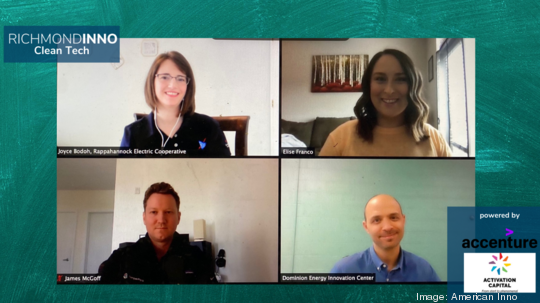
Richmond Inno continued its 2021 virtual event series last Thursday with State of Innovation: Clean Tech.
The hour-long panel was an opportunity to dive deeper into a clean tech-focused story published on Richmond Inno last week. The discussion focused on trends and challenges in Richmond's clean tech and clean energy ecosystem; how the industry has changed, how local clean tech founders are taking advantage of the growing need for sustainability and what leaders, founders and experts expect in the future.
If you missed the live event, keep scrolling to watch the recording.
The panel featured Adam Sledd, director of Dominion Energy Innovation Center; James McGoff, founder and chief product officer of TemperPack; and Joyce Bodoh, director of energy solutions and clean energy at Rappahannock Electric Cooperative.
Below are a few key takeaways from the conversation.
Why is clean tech on the rise in Richmond and across Virginia?
Adam Sledd: Broadly, as a society, we've come to the realization that climate is a huge and pressing problem in both the regulatory sense and people's everyday lives. As innovators and entrepreneurs, this is a ripe area for change ... Richmond is a great place to be an entrepreneur, and I think we're just starting to see this area take off.
James McGoff: I think it's increasing everywhere, overall, which is a good thing. People care more, and there's more and more data coming out that we should be caring about this. There's also a lot of opportunity, whether that's starting a company or investing in a company or scaling a company ... We're happy to be a part of it.
Joyce Bodoh: From a utility perspective, our number one job is to provide electricity 24/7, but people don't purchase electricity for the sake of buying energy, they're really purchasing kilowatt hours so they can do something else like stream movies or do video conferencing. Over time we've really seen this huge shift in corporate members having really high sustainability goals ... We're seeing a lot more people willing to spend money in the sustainability arena.
How has the ecosystem grown over the last few years, and when do you think clean tech really began to take hold in this region?
McGoff: Our business has grown as people have become more comfortable with ordering groceries online. This is really good because whether it's Amazon or Whole Foods, Hello Fresh or Blue Apron, they think there's an opportunity to improve the food system by cutting down the food waste ... Our part in helping that is looking at the packaging, because when you go right to the consumer you need insulation.
Sledd: I think we have to approach it from climate tech now is everything we need to fight climate change, and what that really means is we have to reorganize every part of business, across all businesses, from grocery delivery and packaging to how utilities are delivered ... I think that recognition is still relatively recent. Every part of business is an opportunity to apply clean tech, and I think that's where the real spark is coming from.
Explain how policy and regulation have impacted the clean energy landscape
Bodoh: Virginia joined the Regional Green House Gas Initiative in January, and this is basically a cap and trade auction program where states can get carbon emission allowances. Millions of dollars are now going to be going toward energy efficiency programs and other things that I think are really going to totally open the door to clean tech and energy efficiency and decarbonization.
